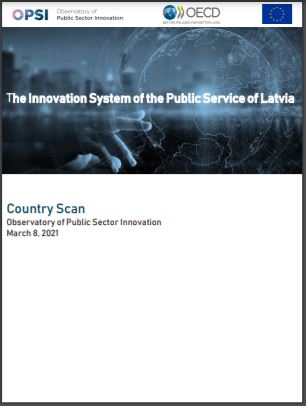Public Sector Innovation Scan of Latvia

Overview
Innovation is increasingly important to the effective functioning of governments. The COVID-19 pandemic highlighted that governments need to be ready and able to respond, adapt to and anticipate the unexpected. In order for innovation to be a reliable option for governments, a systemic approach is required. At the behest of the Latvian Public Service, through the Latvian State Chancellery and with the support of the European Commission, the OECD’s Observatory of Public Sector Innovation (OPSI) conducted a scan of the public sector innovation system of Latvia. The goal was to examine the forces influencing innovation to create a common understanding of the landscape as a foundation for future decision-making and to provide recommended actions to enhance public sector innovation across the Latvian public service.
Based on research including documents provided by the Latvian government, information about innovative projects, and a series of interviews with stakeholders across sectors, this scan observe that the innovation system of the Latvian public service is in early stages, emerging in the wake of previous reforms, including professionalisation and modernisation initiatives.
Common themes identified include that innovation efforts were ad hoc, fragmented, and driven more by individual willpower or happenstance than a strong deliberate positioning within, and as a route to, strategic goals. In this respect, Latvia is in good company, as many governments around the world are learning and grappling with how to ensure a more strategic and consistent approach to public sector innovation.
Latvia notably invested in a whole-of-government Innovation Laboratory, and continues to support the Lab with communications, training, and pathfinder projects to an impressive degree. Together with complementary service design training for practitioners and top-level management, these actions represent specific decisions that can support individuals’ capacity to innovate and a number of organisational priority projects. These have been important contributions to the public sector innovation journey of Latvia which are already demonstrating value.

Ireland’s public service innovation strategy
Ireland’s recently published Public Service Innovation Strategy “coordinates the government’s ambitions and commitment to grow innovation across Ireland’s Public Service,” centred around four priorities:
- Putting users at the heart of services
- Developing a permanent culture of innovation
- Sharing successful innovations to maximise lessons learned and collaboration
- Involving more and new voices in public sector transformation, and experimenting with new technologies and emerging policy approaches.
The Strategy itself comes with multiple implementation supports, such as detailed guidance, tools, and templates.
???????? Ireland
However, the Lab can only take on a limited number of projects, and there is as yet no system-wide directionality for innovation in the public sector. As well, many forces – cultures, policies, laws, and capacity gaps – that exist either as legacies of previous paradigms or in support of goals other than innovation create dampening effects on innovation efforts. While innovation is an ongoing journey of learning and discovery, and there will always be more that could always be done, there is an opportunity for a number of tangible steps to be taken now to speed the evolution and maturity of Latvia’s public sector innovation system.
As the complexity, rate of change, and multi-stakeholder nature of public policy and service delivery is increasingly recognised, innovation becomes foundational for a modern public sector as a way to systematically explore, and learn from, unknowable terrain. This report serves as a launching point for discussion on potential future investments, policy shifts and how Latvia can continue to develop and expand its capability and capacity to deliver innovative outcomes for its citizens.

The Innovation System of the Public Service of Latvia: Country scan
Published on 8 March 2021.
